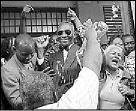Give us Adams
Published: Wednesday | November 11, 2009

Jubilant supporters of SSP Reneto Adams celebrate after he and two colleagues were freed of murder on December 20, 2005. - file
The decision by 61-year-old Reneto Adams to throw his hat into the ring to become Jamaica's next top cop is exciting a great deal of comment and debate, both here and abroad.
With two police commissioners quitting in as many years, many people seem not to understand the true nature of the predicament Jamaica faces at this time. Fewer seem to care that we have lived through a wretched decade, during which Jamaica has been soaked in the blood of thousands of innocents, and washed by the tears of their grieving relatives.
Today, Jamaica stands at the crossroads. I am no security expert, but I suspect there are two rational approaches the Government could take at this time. They could call out the full force of the army with the order to dismantle and cripple criminal gangs in the communities in which they are holed up and run the risk of massive collateral damage that such a drive would entail. Or they could take the middle road and appoint a commissioner who has the energy and drive to root out the criminal element. It is critical that we get it right this time, for how a country organises its system of justice, including law enforcement, is the very essence of nationhood.
Gov't's failure
You can't find a better example of how government has failed to protect its citizens than images of entire communities throwing their belongings together and moving out on the orders of gunmen. The residents get plenty of sympathy from the police who usually hang around just long enough to supervise their flight.
I decided to put this question to everyone I met over the last four days: What do you think of Adams heading the Jamaica Constabulary Force (JCF)? Amazingly, three out of four persons held the view that Adams is the man that could put a dent in criminal activity at this point in time. They gave short thrift to vocal critics who, like a lynch mob, have been expressing their strong opposition to Adams.
In these desolate times, there is a huge public appetite for someone who is brave enough to take the fight to the criminals. People are aching for decisive police action that will signal that law enforcement is nimble and effective. In the current mood, people want to see sacred cows taken down and vested interests shaken. They want results.
A government needs to have its antenna up so it can have a good sense of the mood of the people. For example, the increase in killings described as reprisal seem to suggest that many people are now taking the law into their hands and finding their own solutions for wrongs committed against them.
Criminals not comfortable
So let's talk about Adams. People in St Catherine say when Adams served in the olde capital, the streets were mighty safer. Criminals were not comfortable staying in the same town as Adams. It is said that even in retirement the criminal element continues to tremble at the mention of his name. True, Adams' reputation was mauled when he was charged with murder in connection with the death of seven youth in Portmore. He was acquitted of the crime and we cannot continue to hold it against him.
Law enforcement success has to be calculated in statistical declines in murders and other crimes, and in the ability of the police to apprehend perpetrators of crime. Adams is no bleeding heart, he is a tough cop.
As distasteful as it may sound, I submit that as we stand at our crossroads, we have no choice but to create a model of compromise between the police and those whom they police. I am not in any way, shape or form advocating the use of excessive force. There is a distinct difference between aggressive policing and brutality. The people are clamouring for aggressive policing.
I believe there are some forces within and without who do not want to see Jamaica's crime problem solved. So crime and violence will continue to hamper progress and will keep Jamaica impoverished for a very long time. The question we should ask ourselves is this, who gains from the staggering crime problem?
Dennie Quill is a veteran journalist. Feedback may be sent to columns@gleanerjm.com.















